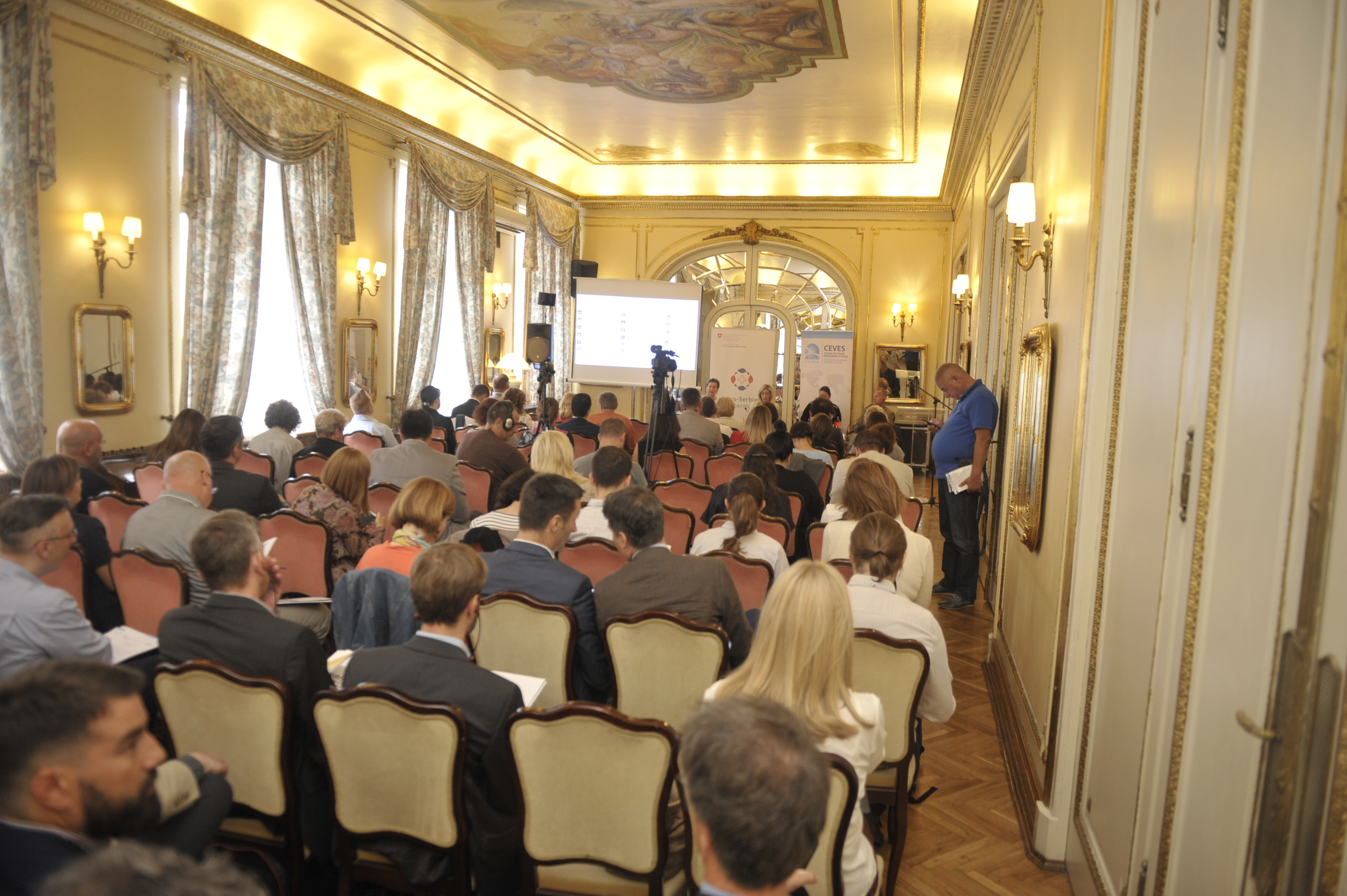August 28th, 2018 Belgrade
The Conference, “Serbia 2030: The Facts and the Options“, held on 28. August 2018 in Belgrade presented the facts and possibilities of sustainable development in the Republic of Serbia by 2030 and fostered a broad debate and discussion among all relevant stakeholders: members of the government working group for the implementation of Agenda 2030, public and private sector representatives, international organizations, donors, civil society and the academic community. The Conference was opened by Chairwoman of the Center for Advanced Economic Studies Kori Udovički, Minister without portfolio responsible for demography and population policy Slavica Djukic Dejanovic, Director of Swiss Cooperation Office, Swiss Embassy in Serbia Ursula Laeubli and the UN Resident Coordinator Karla Hershey.
Minister Djukic Dejanovic emphasized that the focus of sustainable development goals (SDGs) are citizens and that no one should be left behind. When it comes to direct implementation of the SDGs, this work is shared between everyone – because it is impossible to achieve goals without the widest circle of actors in society. Ms. Laeubli stressed the importance of SDGs and that they are incorporated in the framework of the Swiss Cooperation Strategy with Serbia 2018-2021, as well as the Swiss-Serbian Migration Partnership, and that Switzerland will continue to support the nationalization of SDGs in Serbia. Ms. Hershey spoke about the work of the UN in Serbia, the efforts of the Government of the Republic of Serbia in achieving the goals and supporting the dialogue about SDGs in society.
An important topic of the conference was the complementarity between the SDGs in Serbia and the EU accession process. Minister of European Integration Jadranka Joksimovic, Head of Cooperation at the European Delegation Yngve Engstrom, UN Resident Coordinator Karla Hershey and CEVES President Kori Udovički spoke at the panel dedicated to this issue. Minister Joksimović underlined that it is important to talk about the topic of sustainable development, but that we must know that we have already established the context – the process of Serbia’s EU accession has paved the way for Serbia’s development vision. Mr. Engstrom and Ms. Hershey spoke about the European Union’s experience in fulfilling the SDGs, as well as on the benefits of Serbia from the process of European integration in the implementation of Agenda 2030.
The second panel entitled “The starting point – analysis of the challenges” began with the presentation of findings from the brochure titled “Serbia’s Sustainable Development: how are we doing?” done by CEVES. The brochure represents a useful guide to the most important challenges of sustainable development, as well as the benefits that Serbia can rely on in order to accelerate its development. Professor at the University of Belgrade, Faculty of Economics, Mihail Arandarenko, spoke about positive aspects that are hidden below the surface, whose drivers are de novo firms, as well as the problem of Serbia with the export of labor. Olivera Vukovic, Executive Director of SeCons, an organization that has been tracking SDGs for many years, noted that citizens’ trust in the institutions as one of the main challenges of the development process is lacking, as well as lack of indicators for monitoring progress. Mijat Lakićević, Deputy Editor in Chief of the New Magazine, as key obstacle to Serbia’s growth stated legal restriction and bad guided incentive policy. Discussion was moderated by Jovan Protić, National Coordinator for Serbia, ILO.
The final panel entitled “The First Steps – a Debate about the Opportunities” was opened by Christoph Lang, Senior Adviser, Global Institutions Division, Swiss Development Cooperation from Switzerland. Mr. Lang spoke about Switzerland experience in the implementation of the Agenda 2030, their development of a voluntary report and the current state of monitoring of the SDG implementation. Gordana Matković, Program Director of the Center for Social Policy, pointed out that increasing the efficiency, at least as far as the social sector is concerned, is our only opportunity, as well as working on development of full cross-sectoral collaboration, and that investing in education is very important because it is an accelerator for other goals. In the panel, we also talked about ecology, where Slobodan Perovic, Assistant Minister, Ministry of Environmental Protection, spoke about Serbia’s opportunities for creating green jobs and turning towards the circular economy with the possible development of a Green Fund in order to achieve the desired progress. Đorđe Krivokapić, Assistant Professor at the Faculty of Organizational Sciences in Belgrade and the founder of the Share Foundation, addressed the factors of the fourth industrial revolution and the development opportunities that arise from this, such as the impact of technology on the monitoring system, the capacity for public policy analysis and that they can present part of the solution for each issue. The discussion was moderated by Ms. Branka Andjelkovic, Program Director, Public Policy Research Centre, Belgrade.
The conference was held within the project “Preparatory Project for a Society-wide Dialogue Platform on SDGs for Serbia” supported by the Swiss Government and implemented by Center for Advanced Economic Studies (CEVES). Switzerland supported the project with 39 000 Euros, with the aim to initiate a dialogue The event was organized prior to a fall 2018 season that starts with a UN Mainstreaming, Acceleration and Policy Support (MAPS) mission and moves on to an upcoming regional conference on SDGs for exchange of regional experiences.


 SR
SR